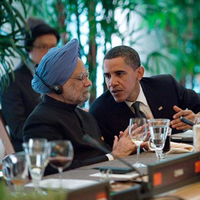Has Washington forgotten about India? After increased engagement and improved bilateral ties under two successive American presidents, several commentators have wondered if President Barack Obama is undervaluing relations with New Delhi. With the new administration's attention centered on developing a partnership with China, stabilizing Afghanistan and Pakistan, re-engaging Russia, and containing Iran and North Korea, it's unclear whether India will be a strategic priority for the United States.
That Washington has been primarily focused on the U.S.-China relationship is understandable. Leadership from today's superpower and tomorrow's great power are seen as essential for addressing transnational threats. U.S. Secretary of State Hillary Clinton says the opportunities for America and China to "work together are unmatched anywhere in the world." But a heightened partnership with China will not happen overnight and will not solve all problems, making enhanced links with India essential.
As a leader of non-aligned countries with a burgeoning economy, nearly 1.2 billion people, one of the biggest navies in the Indian Ocean, and one of the world's most powerful militaries, India is unavoidable. What is more, the U.S. and India share many common concerns. From stability in South Asia to climate change to the future of nuclear nonproliferation, a strong relationship with Asia's other rising power is critical to U.S. interests.

